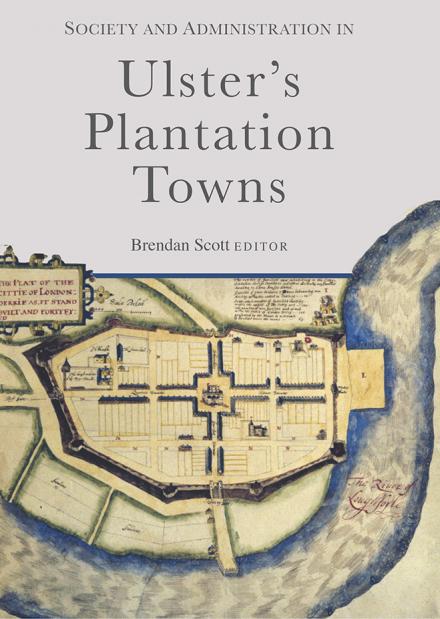Society and administration in Ulster's plantation towns
Brendan Scott, editor
“Featuring original scholarly contributions from specialists in history, historical geography, historical archaeology and anthropology, this collection approaches Ulster’s plantation towns with fresh questions and presents a wealth of fascinating perspectives on how and why these towns developed as they did, often in very unexpected ways, during the seventeenth century ... the editor, contributors and Four Courts Press are to be congratulated on this excellent, handsomely illustrated scholarly volume” Mary Ann Lyons, Irish Economic and Social History 49 (1). 2022
"The essays by twelve well-known writers explore in fine detail various aspects of town history ranging from planning, to development, administration, poverty, and religion post-1609 ... This is an invaluable addition to modern research, which questions many established theories on urbanisation in the early plantation decades. It deepens our understanding of the successes, limitations and challenges that emerged in the establishment and governance of Plantation towns ... Beautifully illustrated with 19 maps and drawings, the book contains extensive references which will provide a valuable template for historians", Seán Beattie, The Donegal Annual (2020).
"This book is a welcome addition to the existing large corpus of material on the establishment and development of the plantation of Ulster by settlers from England and Scotland in the early years of the 17th century ... focusing on the nuts and bolts of the plantation efforts: the establishment of towns, urban government, and a market economy ... The book comes at a topical time when the status of the six counties of Northern Ireland, the particular legacy of the plantation of Ulster, is at the forefront of European diplomatic efforts concerning Ulster ... the book is well balanced and seeks to treat each community with equal sympathy ... The book is truly of interest to anybody with an interest in how an early modern colonisation project was planned, and how those plans were obliged to 'mature' depending on circumstance." David Brown, Current Archaeology.
'Society and administration in Ulster's plantation towns, edited by Brendan Scott, is a fine contribution to the field, offering eleven nuanced and interesting essays on how Ulster's new urban network developed across the course of the seventeenth century. There are a great many topics relating to the towns here, with everything from religious life, economic activity and town governance to ethnic relations and the physical development of these urban spaces being addressed ... what the essays in this volume wholly achieve is to add significant nuance and texture to our understanding of Ulster's plantation towns during the seventeenth century ... ably edited by Brendan Scott and finely produced by Four Courts Press, this volume is a significant continuation of the work pioneered by Robert Hunter many years ago.' David Heffernan, History Ireland (May-June, 2020).
“The recent 400th anniversary of the Ulster plantation has led to many new studies and books containing new and important insights into the plantation period. This book with chapters by twelve of the most gifted Irish historians, archaeologists and geographers, was the brain-wave of Dr Brendan Scott. He, in conjunction with Cumann Seanchais Bhreifne, organised the conference at which all of these papers, with the exception of Gerard Farrell’s, were first delivered. The book is dedicated to the late Bob Hunter whose detailed and novel approach to the plantation period is only in recent years receiving the recognition it deserves.” Liam Kelly, Breifne 2020.
“Brendan Scott is to be commended for producing another collection of essays which contributes significantly to the history of the Ulster Plantation in its early decades … While the essays by Cherry, Gillespie, Annaleigh Margey, Rachel Tracey and Audrey Horning provide comparative considerations of settlements of varying nature and size across Ulster, further highlighting distinctions between sites, the essays by Bríd McGrath, Brendan Scott and William Roulston focus on specific towns and the individuals or families who administered them (Coleraine, Belturbet and Strabane respectively) ... a brief review cannot do justice to the depth and breadth of this highly recommended collection which significantly furthers our understanding of the Ulster Plantation’s early history and the communal identities and relationships generated by town development. Although essays such as those by McGrath, Fitzgerald and Gillespie could easily stand alone, the collection must be read in its entirety in order to digest fully the import and impact of the essays’ interlinking themes and overlapping connections. Their complementarity and the consequent conclusions to be drawn collectively from them add considerably to the collection’s value. It goes beyond excavation of new approaches to the plantation, providing essential and novel contextualisation for events such as the 1641 Rising.” Valerie McGowan-Doyle, The English Historical Review, 2021
